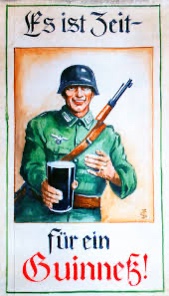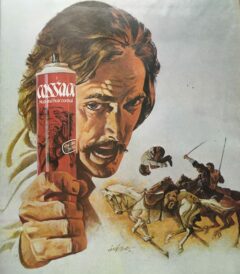Guinness advertising is almost as iconic as the drink, but it wasn’t always ice cool..
When we think of Guinness we usually think of of harps, toucans and surfing horses but Guinness advertising has been around as long as advertising has. In fact, it’s known that Dorothy L. Sayers worked on the Guinness contract in her day job with an advertising company in the 1920s. The ‘surfing horses’ ad from 1999 won a Sunday Times poll as best advert ever. It was certainly impressive with its Moby Dick/ James Joyce literary references and state of the art filming techniques but not all their advertising, though certainly creative, has been quite so impressive. It does plot the course of social attitudes and change , however, in an extremely interesting way.
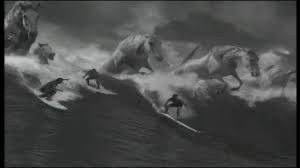
Although Guinness TV advertising began in 1955, the first significant advert was broadcast in 1962 when the theme was ‘After Work‘. Here we were shown a range of people finishing work including a farmer and a male and female factory worker. In the next shot they are at their local having a Guinness, except for the woman who is at home as she obviously has her husband’s tea to make! But we do see her having her tea accompanied by a Guinness, which was quite groundbreaking for the time. More groundbreaking when you consider this was the first time on TV anyone was shown actually drinking Guinness, and a woman to boot! This slightly egalitarian approach didn’t last too long, however, at it would be many years before women would be seen drinking Guinness on TV again.
The ‘After Work‘ theme was continued in 1966 but this time the advert was a little more sophisticated, although not in terms of gender politics. Some nicely shot footage of a dockyard and, uncharacteristically for Guinness, soft music were used for this ad. Once again, the ad appealed to the manual labourer and a Guinness was the least he could look forward to after a hard days grafting. These adverts were created at a time when UK industry was just getting back on its feet after the war and employment was relatively plentiful. And there were no problems associating alcohol with work or even as a ‘treat.’ !
In the late 60s the massive Guinness advertising contract was handed over to the American advertising company J. Walter Thompson and this was when Guinness advertising became distinctive and certainly more creative. One of the more recognisable elements of the Guinness ad, though not used in all, was the laconic gentle male Irish voiceover. Although I’ve been unable to find out who this almost familiar voice was, and he became one of the most instantly recognisable voices in advertising, this format lasted for nearly 15 years. Used to highlight the Irish association with Guinness it provided a backdrop to a range of Guinness-drinking scenarios, usually taking place in a stereotypical ‘local’. For many years, purely targeted at men, the scenarios usually involved women as nags, slaves or just appendages who got in the way of their men enjoying their Guinness. Unless , of course, she was supplying him with it.
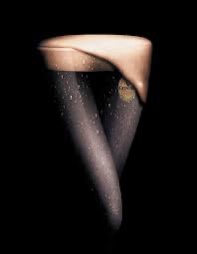
An example is 1970’s ‘Take Home Rain‘ ad which won the bronze advertising award at the Cannes Film Festival the same year. A young man and woman are painting a room in their house and outside we can hear the wind and rain hammering down. ‘Get me a Guinness love, would you?’ says the man. The woman looks slightly anxious. Next shot we see her leaving the house and being battered by the wind and rain, forcing her way to the bar through a crowded ‘local’ and then holding her hand over the glass of poured Guinness to keep the rain off. She walks into the house and hands the Guinness to her husband who replies, ‘Thanks love. Didn’t you get yourself one?’ One wonders if some of those adverts were being ironic about the role of women in the lives of male Guinness drinkers, and, if so, these could have been funny but it seems unlikely as the ad company came up with so many similar storylines that the joke wore thin very quickly. If there ever was a joke.

Throughout the 60s and 70s Guinness was targeted at men by men, as were most other alcoholic beverages other than Babycham ( I’d love a Babycham!) and Pony (The little drink with the big kick!) or if she was a particularly hard drinker, a Cherry-B. Women were rarely seen in Guinness’ ‘locals’ unless, of course, they were behind the bar. Some Guinness adverts were ostensibly aimed at women, however, but through being aimed at women they were really being aimed at men. The good people at Guinness were giving the little women advice on how to keep their men happy. ‘ If he says he’s popping out for a ‘quick one’, don’t expect him back too soon.‘ You can almost hear the word ‘love‘ at the end of this sentence. ‘He‘ does, of course, have to wait on the black gold settling, so tough luck, darlin’. In another early 70s ad we see a woman struggling home with a shopping basket full of messages including a six-pack of Guinness. ‘ Mrs Angela Hunt has just been down the road for a Guiness or two.’ What is this woman? An alcoholic? A social deviant? A feminist! We’re not fooled by this for a second though as the Guinness, of course, is for her husband, ‘..who believes shopping is a woman’s job.’ Phew. Had us going for bit there! In another ad from around the same time the chummy Irish voiceover suggests to the man sitting in the armchair about to empty his glass,’ If you’re just finishing a glass of Guinness, where’s your next coming from? You’ve still time to pop out to get some. In the meantime, here’s some music for your wife.’ Cue unthreatening easy listening dirge. In some ways this could be seen as progress. At least ‘the wife’ isn’t being expected to fuel her husband’s alcohol intake. But the little lady still hasn’t been invited to ‘the local’ quite yet.
That was all going to change though. And who’s this strutting about in ‘the local’ looking like she owns the place, even playing darts? Why it’s a member of the 70s TV Royal Family, Liza Goddard. And it was during this mid-70s point that advertisers suddenly had a brainwave and realised that maybe, just maybe, women might be a market worth exploring. In this ad we see the customers, Goddard and male companion, from the point of view of the barman. She is playing that ever-so-unfeminine activity at the time, darts, she’s not dressed in the twin set or three-quarter length cocktail dress of previous women in Guinness adverts but like a man in shirt and jeans. ‘Another?’ the barman asks the male companion. ‘Yes please‘ says companion knocking back the last of his Guinness. ‘And what about.…? asks the barman, clearly not wishing to acknowledge the fact a woman has found her way into his snug. ‘Two Guinnesses‘ says the man, ‘What? You both drink it? Oh come on..’ replies the barman incredulously, clearly feeling the basis of human decency has come crashing down around him. ‘Bit of gentle persuasion then?’ he eventually giggles nervously when it’s sunk in. ‘Not really‘ says Goddard (who asked her to butt in?), ‘I just got him to try one.‘ Her companion’s face suddenly screws up into one of shock and embarrassment at this admission of emasculation. Oh, the horror! The horror!.. So put that in your pipe and smoke it Neanderthal bar person. The forces of Feminism are about to engulf your whole life, not just your bar! She may have had to behave like an honorary man to be accepted into this most testosterone-filled of TV environments but she was crashing through the metaphorical glass partition between Cocktail Lounge and bastion of masculinity, the Bar. Although groundbreaking, this didn’t open the floodgates to female-orientated Guinness advertising quite yet, but it did signal a change which was reflected in a few of the subsequent campaigns.
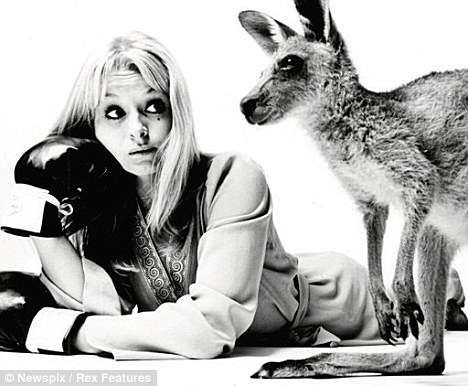
In an ad not long after, a young, blonde woman is dozing in a hammock on what is clearly a Summer’s Sunday afternoon in Middle England. We hear the church bells peal and insects buzz around as the laconic voiceover prepares us for a Guinness being poured off-camera. The effervescent sound of the beer being decanted into the glass is heard and then a perfectly poured glass of Guinness appears, held by a disembodied male hand, and is offered to the woman who accepts it gratefully. We’ve come a long way with this ad. Not only is it just the woman shown but we only see a male hand. On the debit side, however, she is in a garden and not in ‘the local’. It was still a little early to be showing only women in a pub. But it was further progress of sorts!
A little later a strange advert from the late 70s featured a young girl in a night club with friends and the fact she was the main character in this story was significant. She is drinking Guinness and talking about what a great drink it is. A guy hears her talking about how great it is and asks her to dance thinking she’s talking about the club. Their conversation carries on at cross purposes. Eventually she takes him over to the bar to buy him a Guinness. A woman buying a guy a drink was unheard of. She even knows the name of the barman as she orders two Guinnesses (this is a fallacy of alcohol advertising where they try to make out all customers know the barman by name). The pay off is when she looks at him and says ‘Do you come here often?’, so we have the woman making the running, and another sacred cow of advertising relationships is milked to within an inch of its life. Although slightly baffling, it was the moment Guinness advertisers embraced the female market and accepted that women were not just there to keep their husbands happy and non-violent by making sure they had their Guinness.
Like the After Eight campaigns (See below: They Must Be Worth A Mint: After Eight Advertising In The 60s and 70s), the frequency and fairly healthy budgets of Guinness advertising attracted some up-and-coming young ( and old) acting talent. We have already mentioned the lovely Liza Goddard in her post-Skippy but Pre-No Honestly days and certainly before her rather strange marriage to Alvin Stardust (more on odd celebrity marriages later). But isn’t that Shakespearian acting royalty Nigel Hawthorne knocking back a pint of the black gold? It certainly is, and in a way Sir Humphrey Appleby would find rather vulgar. But, would you Adam and Eve it, Jonathon Lynn who actually wrote Yes Minister is in one here where he’s the Best Man to a nervous groom and gets him to knock back a pint of Guinness to calm him down. Good idea. But who’s the groom? None other than Roy Cropper from Coronation Street! Just fancy that. Talking of Coronation Street, there’s Alf Roberts, also from Corrie, supplementing his meagre corner shop income by moonlighting for the dark nectar. Next up it’s pre-All Creatures Great and Small‘s booming-voiced Christopher Timothy in his kitchen laboratory failing to invent a decent cheaper alternative to Guinness. Lucky the little wife has humped a six pack all the way back from the shops for him in her shopping basket. Because he’s worth it. And, bloody hell, it’s a sweaty Jeffrey from Rainbow behind the bar trying to avoid serving some perspiring thugs ice-cold Guinness (‘No call for it around here.‘ Really? Where are they? The Gobi Desert?).
During the 60s and 70s the advertisers clearly tried to appeal to men only and believed that drinking Guinness was, some time before Old Spice, the ‘Mark Of A Man’. Of course, the timing of these type of ads coincided with the rise of, what was called at the time, Women’s Lib. Whether these ads were a response to this social change or merely reflected it is uncertain but it was almost like they were trying to protect a last stronghold of masculinity. A ‘man’ was someone who visited his ‘local’ regularly, this ‘local’ was populated mainly by other ‘men’, the bar person and customer knew each other by name (often ‘George’ for some odd reason), if any women had managed to sneak in they sat silently in shadowy corners, coiffured to the hilt and dressed in an unthreatening twin set, sipping a vodka and lime or Cherry B. But the mark of a real man was when he had shaken off the shackles of marriage and family, had almost broken his neck getting to the ‘local’ before closing time (10.30pm!) and was eventually given this pint of cold Guinness and he would knock it back in a oner. And time for another! During my life I have known people who could sink a pint in one go, although I was never one of them, but I have never known anyone who would find this pleasurable, other than to entertain a crowd.
All advertising, particularly in the 50s, 60s and 70s, was a barometer of social attitudes and change and Guinness ads are a perfect example of this. By the late 70s women were not only being, grudgingly, allowed into ‘locals’, they were even drinking Guinness themselves. And the pivotal point was probably in the late 70s when we saw that sleeping woman in her garden and a disembodied man pouring her a glass of Guinness. But she was in her garden and not in the ‘local’. Was this just a concession thrown from the male drinking establishment? And if truth be told, nearly 50 years after these TV ads began, few women on their own would go into a pub today unless they were meeting someone.
Guinness went on to create some truly memorable TV ads from the 80s onwards where artistic creativity took the place of social conservatism but, looking back and viewing them with a healthy head of irony, they were interesting, often funny and they did try to change with the times. But, as they might say, within reason.
And after all that, ‘Could you go out in that wet, freezing, stormy night and get me a Guinness please, love?’ I think I deserve one.
